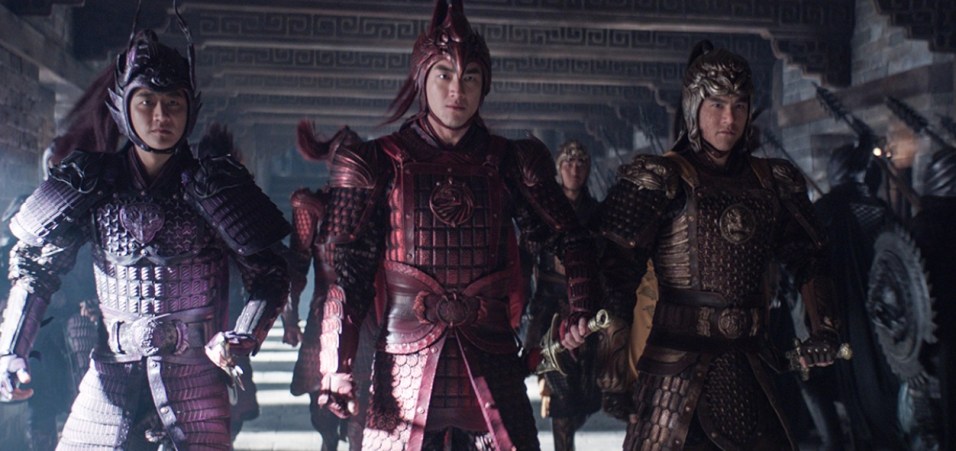#REVIEW The Great Wall

Spanning thousands of miles, the Great Wall of China stands as both, one of mankind’s greatest accomplishments and the most laborious security measure ever to be put in place. The wonder speaks to the country’s historic fear of a Mongol invasion through thousands of years of brickwork. Or so we thought. It turns out the wall’s real purpose was to hold back vicious monsters set on devouring the Chinese population. At least this is what The Great Wall, the Chinese/American co-production and latest from director Yimou Zhang (Hero, House of the Flying Daggers), would have us believe.
The film centers on William (Matt Damon) a European mercenary that has come to China in search of the legendary weapon black powder. In an attempt to flee a perusing mountain clan William and brother in arms Tovar (Pedro Pascal) happen to stumble across the largest architectural feat in the world. There they learn the truth about the wall, that it stands to keep out the Tao Tei, lizard-wolf like monsters that return to attack every 60 years. Now they must decide to either snatch some black powder and make for the hills or stay and help keep the demons at bay.
Right from the onset The Great Wall relies heavily on its high concept, getting down to brass tacks as quickly as a comprehensible plot will allow. No sooner do William and Tovar arrive at the wall (which happens about ten minutes into the movie) than they are witnesses to the first Tao Tei attack in 60 years. This also happens to be the largest and most spectacular action sequence of the film. If you are one who cannot bear anticipation in monster movies that slowly build up to a grand reveal of the creature, this movie may just be for you.

The few emotional and character moments that find their way into the film are handled in the most heavy-handed ways possible. Here, characters mostly give exposition through dialogue as direct as it comes. One particular moment that stands out is when commander Lin Mae (Tian Jing), the films female principle, leads William out to the top of the wall so he can test out their repelling equipment. William refuses her offer because someone else will have to operate the winch that will pull him back up and, as he explains, he lives his life by one rule, never trust anybody. This prompts a long discussion, as far as long discussions go in this movie, about the idea of trust and what it means to Lin Mae and her people. In this one scene the lecture proves to be enough to reform the mercenary into a chivalrous Samaritan ready to lay down his life for his newly found comrades.
Granted, not many will likely seek this movie out for its character and emotional threads. The strength of the film, obviously, lies in its action set pieces. These play out in a very cartoonish manner, in so much that they display a type of absurd inventiveness that feels totally at home (and enjoyable) within the context. This is best exemplified in the colour-coordinated divisions of the army (red for archers, black for foot soldiers, etc) and various intricate weaponry built into the wall itself. For every wave of attack that comes, the Chinese soldiers reveal another zany countermeasure. Perhaps the most ridiculous amongst these are the aforementioned repelling mechanisms. Using these, soldiers strap themselves into harnesses, connected to lines leading back into a pulley system, and armed with a spear walk out onto extended platforms that lead off of the wall. From there they dive off, plummet the 75 feet to almost ground level where they cab stab at the Tao Tei attempting to claw their way up the wall and then get yanked back up to safety before they get snapped up by the monsters. These amongst the variety of other wild contraptions, like giant scissors that slide out of the wall or the whistle arrows that are shot into the Tao Tei so that fighters on the ground may hear their approach, give the battles a sort of anime turned live action feel.
One major drawback to the action in The Great Wall, however, is the lack of compelling choreography throughout. This, I would imagine, should come as a shock to many, as director Yimou Zhang has employed some very beautiful wire-work in several of his past Wuxia films. One would imagine that The Great Wall would have been the perfect avenue to flex those muscles again and give us something akin to Jason Borne meets 1990’s Hong Kong cinema, but unfortunately this was not at all the case.
In the end, The Great Wall does manage to achieve some visually stunning moments (the film was shot on location, though not on the actual wall). The action set pieces, which I imagine is what every audience member will pay the price of admission for, gets by on the comic frame it sets itself up within. However, the lack of strong choreography does take a rather sizable toll.
Universal Pictures Canada releases The Great Wall on Friday, February 17, 2017

